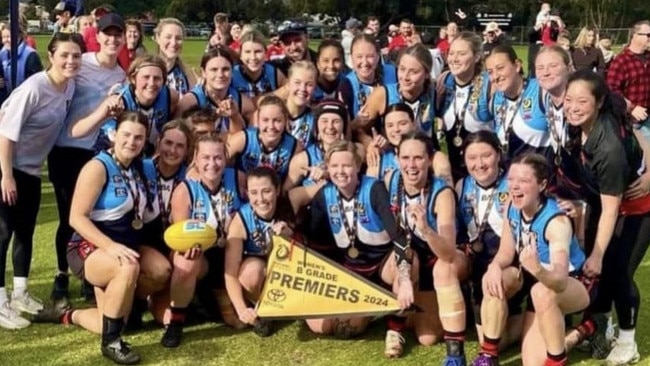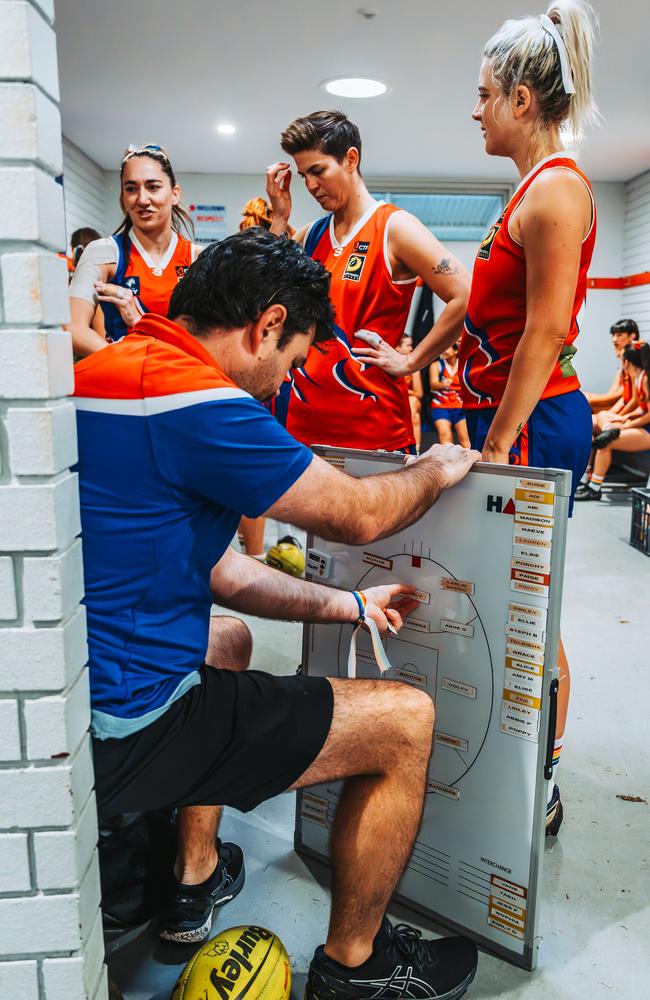When amateur AFL clubs opened the door to women, something ‘remarkable’ happened
Clubs buckling under the lofty weight of ‘old school’ values turned a major corner when they made one big change.
AFLW
Don't miss out on the headlines from AFLW. Followed categories will be added to My News.
As battling amateur AFL clubs contemplated the viability of their future, an army of eager players with untapped potential waited on the sidelines, desperate to be subbed in.
Female players – some scouted in shopping centres and while walking their dog – have in the last few years completely overhauled the sport in Western Australia’s Perth Football League.
The revolution – in many ways a rebirth – signalled a long overdue change that has unsurprisingly revitalised clubs that may have otherwise collapsed entirely.
The game, at least across Perth’s amateur AFL league, has undergone an enormous pivot since welcoming female participation, with 60 of the 73 clubs having at least one women’s team in 2024.
Clubs that formerly barely kept afloat; threatened by increased costs, dwindling attendance and players spending less on club food and drinks, are now bursting at the seams.
Their biggest problem in 2025 is expected to be co-ordinating the tight logistics surrounding where and when the teams will practice and play due to sheer volume.
Women’s coach David Carruthers said membership had ballooned to double its previous numbers at Bullcreek Leeming thanks to women. He said the effects had filtered into every part of the club.
“There’s an extra 60 ladies that we didn’t have at the football club before so that in itself is a huge input to the club financially, and it means there’s more help on the committee and with setting up,” Mr Carruthers told news.com.au.
“Our Ladies Day and our other events have tripled in size. It’s been good in so many ways to have them around.”
The female Bullcreek Leeming team isn’t just participating, they’re dominating. They have climbed a grade every year since starting, and just claimed victory in the B grade grand final.
In doing so, they also became the first in the club’s history to qualify for the league’s A grade competition for the following season.

“It’s the first time Bullcreek Leeming has ever been in A grade, men or women,” Mr Carruthers said, describing it as “a huge achievement for the ladies”.
There were significant differences in how female players approached the sport too.
“They all rock up, they don’t miss training,” Mr Carruthers said.
Without them, “everything would’ve halved, if not quartered in size”.
“We had 180 people at our end of year Best and Fairest night this year, whereas prior to that we had 90 to 100,” he said.
He said the club’s facilities were also bulging with the boom in female membership.
“We actually need more parking spaces and bigger change rooms to fit the extra two female teams in … we definitely need a bit of an upgrade at the club just to fit everyone in.
“This year we struggled with ovals too. Between the juniors and the amateurs we had seven extra teams of ladies, and to find them ovals for their training wasn’t easy.”
Unfortunately a small number of clubs in the league have yet to welcome female teams and Mr Carruthers had one message for them: “you’re missing out”.
“The positive input they have on the club, you just can’t match. People of the old ways just need to be filtered out because the ladies make the football community a lot better.
“They’re all just there to learn the game, work hard and have their own input.”
Perth Football League’s Brand and Growth Manager Jarryd Emery said the influx of female players had been “remarkable” for all areas of the competition.
“The introduction of women’s football has often revitalised clubs, leading to more inclusive and welcoming environments,” Mr Emery told news.com.au.

“It has also injected fresh energy and enthusiasm, particularly in clubs that may have been struggling. Women’s teams have become a driving force for cultural transformation and financial stability.”
The women’s competition has exploded from a humble 16 teams in 2018 to a whopping 68 teams in 2024, in what has enforced a major culture shift and attracted a new wave of sponsorships.
“As more women join the sport, it has a ripple effect – attracting new members, increasing community engagement, and opening up additional sponsorship opportunities,” Mr Emery said.
“It’s an exciting period for the PFL, and we’re committed to supporting the continued development of female football across all clubs.”
He stressed that pressure was being applied to clubs without female teams, and the PFL made it clear to them they would be expected to welcome women soon.
“Typically, the clubs that have not yet established a women’s team tend to be smaller clubs,” he said.
“These clubs are actively working towards building a women’s team but need to generate the required participation numbers to make this viable.
“Importantly, the desire to include female players is definitely there, and we are optimistic that all our member clubs will eventually have a women’s side.”
The PFL has served as a pure example of the power of women and the infinite doors that open when they’re simply allowed to participate.
brooke.rolfe@news.com.au





